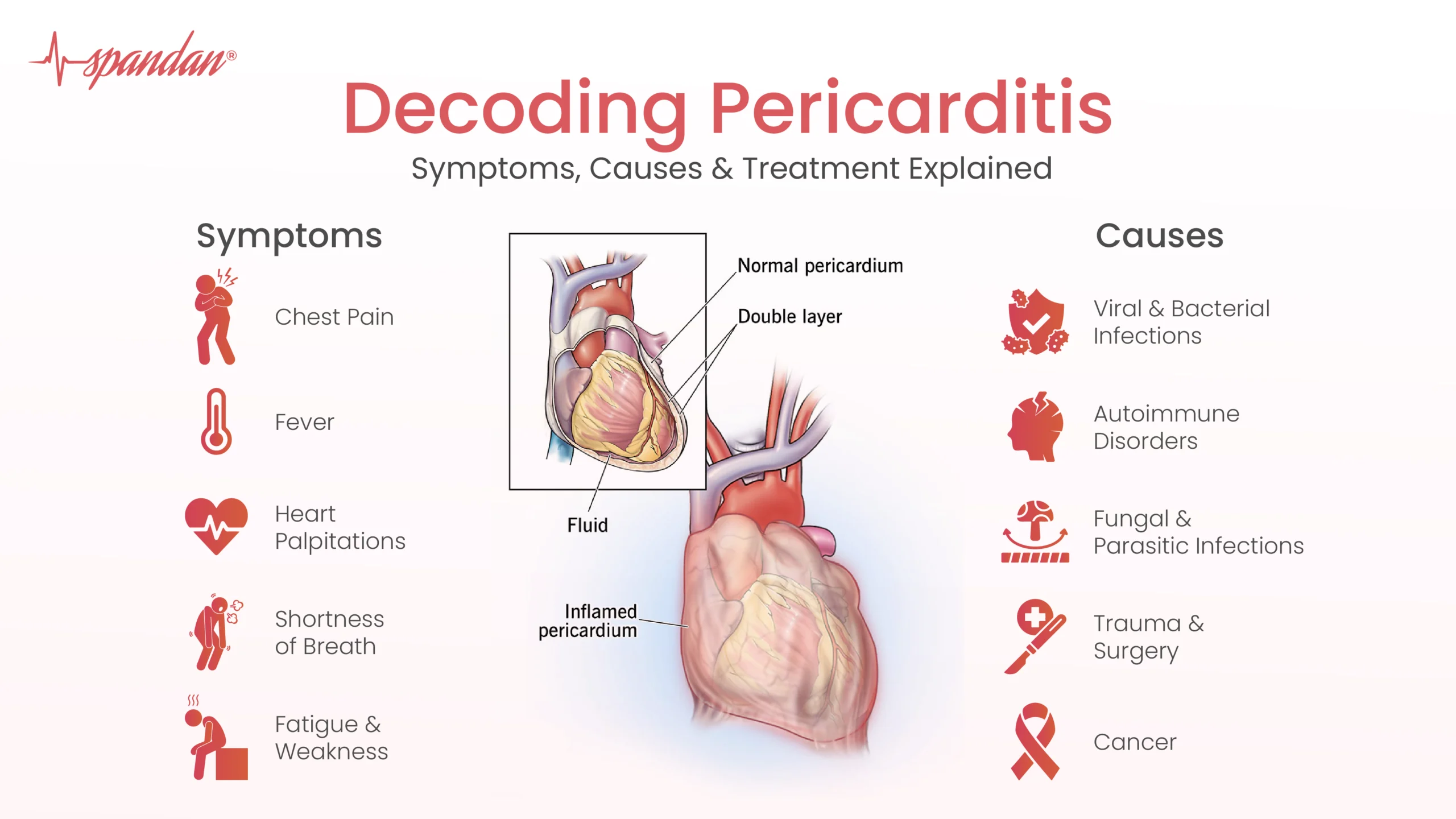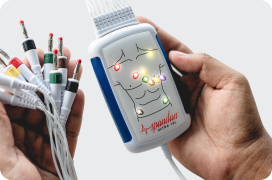
Author:- Mr. Ritesh Sharma
The human heart has a thin sac-like membrane surrounding it. This membrane is known as pericardium. When inflammation occurs in this membrane, the condition is termed as pericarditis. This is a condition that nobody generally talks about. However, it is important to note that this condition can lead to serious complications in the heart leading to drastic outcomes in the domain of cardiovascular health. Hence, it becomes important to identify this condition as quickly as possible and adopt the correct treatment method.
Furthermore, to steer clear of this condition, you must adopt the correct prevention strategies and methods. You must identify the symptoms of pericarditis, promptly consult a healthcare professional, and then take all the prevention strategies. There are several causes of pericarditis as well that you must know so that you don’t get affected by it. This blog will cover all the aforementioned and more.
Hence all general people and clinicians must learn about pericarditis, its causes, symptoms, and treatment to ensure they are not affected by this under-discussed but hazardous condition.
Understanding Pericarditis
As we mentioned earlier, pericarditis is an inflammation of the pericardium, the thin, sac-like membrane surrounding the heart. This membrane consists of two layers: a fibrous outer layer and a serous inner layer. The pericardium has several functions, including anchoring the heart within the chest, preventing over-expansion of the heart when blood volume increases, and reducing friction between the heart and surrounding structures during heartbeats.
Pericarditis Symptoms
The symptoms of pericarditis can vary widely depending on the severity and the underlying cause of the inflammation. Common symptoms include:
1. Chest Pain
Chest pain is the hallmark symptom of pericarditis. It typically presents as sharp and stabbing pain behind the breastbone or on the left side of the chest. This pain may worsen with deep breathing, coughing, or lying down and often improves when sitting up and leaning forward.
2. Fever
A low-grade fever may accompany pericarditis, indicating an inflammatory or infectious process.
3. Pericardial Friction Rub
A distinctive sound called a pericardial friction rub can be heard through a stethoscope. This sound results from the inflamed pericardial layers rubbing against each other.
4. Shortness of Breath
Difficulty breathing, particularly when lying down, can occur due to the discomfort and inflammation in the chest area.
5. Fatigue and Weakness
General feelings of fatigue and weakness are common, likely due to the body’s response to inflammation.
6. Heart Palpitations
Patients may experience an irregular heartbeat or heart palpitations, which can be unsettling and sometimes alarming.
7. Swelling
Swelling in the abdomen or legs can occur if pericarditis is accompanied by fluid buildup in the pericardial space (pericardial effusion).
Causes of Pericarditis
Pericarditis can result from a variety of causes, which can be broadly categorized into infectious, non-infectious, and idiopathic origins.
Infectious Causes
1. Viral Infections
Viruses are the most common cause of pericarditis. The Coxsackievirus, influenza, HIV, and other viruses can lead to inflammation of the pericardium.
2. Bacterial Infections
Although less common, bacterial infections such as tuberculosis can cause this.
3. Fungal and Parasitic Infections
Fungal infections (like histoplasmosis) and parasitic infections (such as toxoplasmosis) are rare causes of pericarditis but can occur in immunocompromised individuals.
Non-Infectious Causes
1. Autoimmune Disorders
Conditions like lupus, rheumatoid arthritis, and scleroderma can lead to pericarditis as part of a broader inflammatory response.
2. Myocardial Infarction
It can occur after a heart attack (post-myocardial infarction pericarditis), typically within a few days or weeks.
3. Trauma and Surgery
Chest trauma or heart surgery can lead to inflammation of the pericardium.
4. Cancer
Metastatic cancer, particularly from the lungs, breast, or lymphoma, can invade the pericardium, causing inflammation.
Idiopathic Causes
In many cases, the exact cause of this cannot be determined, and it is termed idiopathic. Despite extensive investigation, no specific cause is identified in these instances.
Diagnosing Pericarditis
To diagnose pericarditis, a variety of tests are done so that the healthcare professional can be sure of the presence of the medical condition. The following are the tests that are needed to be done to diagnose pericarditis.
1. Medical History and Physical Exam
The physician will inquire about symptoms and listen for the characteristic pericardial friction rub.
2. Electrocardiogram (ECG)
An ECG can reveal changes indicative of pericarditis, such as widespread ST-segment elevation.
This imaging test uses ultrasound to visualize the heart and pericardium, helping to identify pericardial effusion or other abnormalities.
4. Chest X-Ray
A chest X-ray can show an enlarged cardiac silhouette if significant pericardial effusion is present.
5. Blood Tests
Blood tests can help identify markers of inflammation (e.g., elevated C-reactive protein) and underlying infections or autoimmune conditions.
Pericarditis Treatment
For adopting the treatment options for pericarditis a few parameters are considered- the underlying cause, the severity of symptoms, and the presence of complications. Based on these parameters, the following treatment strategies are adopted:
Medications
- Nonsteroidal Anti-Inflammatory Drugs (NSAIDs)
NSAIDs such as ibuprofen are commonly used to reduce inflammation and alleviate pain.
- Colchicine
Colchicine can be prescribed to reduce inflammation and prevent recurrence, especially in cases of recurrent pericarditis.
- Corticosteroids
Corticosteroids like prednisone are reserved for severe or refractory cases due to their potential side effects.
- Antibiotics or Antifungals
If a bacterial or fungal infection is the cause, appropriate antimicrobial therapy is necessary.
Drainage Procedures
In cases of significant pericardial effusion or cardiac tamponade (a life-threatening condition where fluid compresses the heart), a procedure called pericardiocentesis may be performed to drain the excess fluid.
Surgical Options
For chronic or recurrent pericarditis that does not respond to medical therapy, surgical removal of part or all of the pericardium (pericardiectomy) may be considered.
Lifestyle and Home Remedies
Patients are often advised to rest and avoid strenuous activities until symptoms improve. Gradual return to normal activities is recommended as inflammation subsides.
In conclusion, due the property of inflammation, pericarditis is a dangerous medical condition that requires prompt attention if you are affected by it. Hence, don’t dismiss its symptoms and act immediately if you feel them. Furthermore, before taking the action in your hands, consult a healthcare professional and take their worthy advice. Remember staying vigilant is the key to a stronger heart that is free from all kinds of heart problems including pericarditis.





